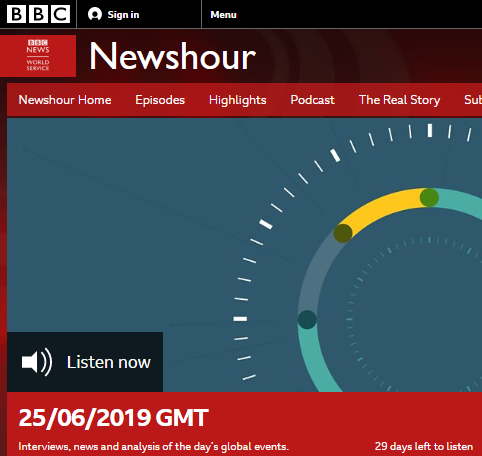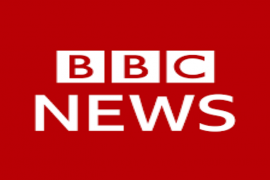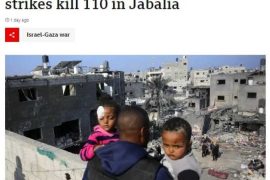The top story in the evening edition of the BBC World Service radio programme ‘Newshour’ on June 25th was described as follows by presenter Tim Franks in his introduction to the programme: {emphasis in italics in the original, emphasis in bold added]
Franks: “It’s eluded the Israelis, the Palestinians and countless US administrations but now this White House says it has a brand new detailed plan for Middle East peace. Today we got part one: the economic vision for the Palestinians. It’s our top story.”
The item itself (from 00:57 here) was presented thus:
Franks: “We’re used to big, bold talk from President Trump but on one thing we can probably all agree: that were his administration to be able to conjur a full peace accord between Israel and the Palestinians, it would indeed be – as Mr Trump put it – the ultimate deal. Today we got the long-awaited first part of the plan, drawn up under the aegis of one of his closest – if not the closest advisor – his son-in-law Jared Kushner. At what’s been billed as an economic workshop in Bahrain, he’s laid out his proposals for fifty billion dollars’ worth of investment in the Palestinian territories and neighbouring Arab countries. Mr Kushner appealed for open minds and for patience.”
After listeners had heard two segments of recordings of Kushner speaking at the conference, Franks went on:
Franks: “The White House says this is about trying a new approach to improve the Palestinians’ prospects after many years of political stasis if not outright failure. Palestinian leaders though are boycotting the event, furious about what they say is the Trump administration’s bias against them. White House officials say they’re unmoved by that show of intransigence. They’re interested instead in appealing to ordinary Palestinians keen to improve their parlous economic prospects. Our Middle East correspondent Yolande Knell has been speaking to some of those Palestinians.”
Listeners then heard a report from Yolande Knell which was similar to both a televised report billed Palestinian poverty which she produced for BBC One’s ‘News at Ten’ on June 20th and an article she wrote which was published on the BBC News website on June 25th under the headline “Trump’s ‘deal of the century’ falls flat in West Bank”.
Knell: “It’s not long after four o’clock in the morning. It’s still pitch-black but the street here is teeming with people. There’s a small, informal market place that’s popped up overnight and some are stopping to buy some breakfast, some falafel sandwiches, a cup of coffee. These are Palestinian workers heading into the Israeli checkpoint.”
Listeners heard a voiceover translation of a man saying:
“The economic situation isn’t good. That’s why we have to go to Israel to work because there are no job opportunities.”
Knell: “Rasmi, from Hebron, has nine people depending on him and earns three times more in Israel as a builder than he could at home. With the West Bank economy in dire straits, it relies heavily on the tens of thousands of labourers like him with Israeli work permits. But here at the Taybeh Brewery near Ramallah they say business could be fizzing as much as the bottles of beer on their production line if it wasn’t for the tough political situation.”
Woman: “Doing business in this country is unlike anywhere else in the world. We are a Palestinian company under occupation and we don’t have our own borders, we don’t have control over the water, electricity. Anything that comes in and out of the country is through Israel.”
The Taybeh Brewery is situated in Taybeh which is in Area B and has been under Palestinian Authority civil control and Israeli security control since the year the brewery was founded, 1995. Just as the representatives of the Palestinians agreed to the zoning into Areas A, B and C, they also agreed to arrangements concerning water and electricity. The Palestinians have their own Water Authority and get some of their electricity from the Israel Electric Corporation – to which the Palestinian Authority currently owes hundreds of millions of dollars in unpaid debt.
Knell: “Instead of the White House promising aid or outside investment, Mdees Khoury says a lot could be achieved by finding ways to ease Israeli restrictions – measures Israel says are for its own protection. For her family’s firm, these can mean costly delays of imports and in distribution to local and foreign markets, which is via Israeli checkpoints and ports.”
Knell of course did not bother to mention the Palestinian terrorism which made checkpoints necessary.
Khoury: “Palestinians are very smart people. They’re very determined, they’re very hard-working and they’re very highly educated and if they just get the chance to be left alone they could thrive and succeed and this country would be amazing.”
Knell: “But in Gaza, where the economy’s stagnated in the past decade, there’s less optimism. Israel and Egypt tightened border controls, citing security concerns, after Hamas – which is widely seen as a terrorist group – took over. Hamdi has no job and lives with his six children in one room. They struggle to get by on Qatari donations of $100 a month. ‘That money isn’t enough’ he says, ‘it just goes to pay our debts’.”
Once again Knell sidestepped the crucial issue of the terrorism which brought about the situation she describes. Listeners next heard shouts of ‘go home’ but Knell did not bother to inform them that the “protests” she went on to describe were organised by the PA’s ruling Fatah faction.
Knell: “Already there’ve been Palestinian protests against the Trump administration’s economic plan. While Israel says it’s keeping an open mind, it’s been rejected outright by Palestinian leaders. The prime minister, Mohammad Shtayyeh, says a political solution is needed.”
Shtayyeh: “This workshop is simply a political laundry for settlements and the legitimisation of occupation. The Palestinian leadership is not part of it and we think that the outcome is going to be fruitless and it is simply nonsense.”
Knell: “Back at the turnstile of the Bethlehem checkpoint, Rasmi the builder is returning home, tired at the end of a 16-hour day. He stops to buy grapes from Issam, a farmer turned fruit seller who sets up a stall here each afternoon. He tells me that there’s no work in his village.”
Issam: “Our officials can’t open new buildings or factories. They don’t have the resources.”
That of course would have been the ideal opportunity for Yolande Knell to point out that some 7% of the Palestinian Authority’s annual budget – around $330 million a year according to a BBC report from a year ago and more according to other sources – is spent on payments to terrorists and their families. Knell however refrained from providing listeners with that relevant information.
Knell: “Can President Trump fix the Palestinian economy?”
Issam: “No. From what we saw when he became the president, he has done nothing to help the Palestinian economy unfortunately.”
Knell: “With financial woes at the heart of so much suffering here, it’s easy to see why White House aides view the economy as a way to exert influence. But so far, few Palestinians are buying their argument that the ‘deal of the century’ could be their opportunity of the century.”
The rest of that nearly twelve minute-long item was given over to a conversation between Tim Franks and David Makovsky of the Washington Institute for Near East Policy think tank who attended the workshop in Bahrain. During that conversation Mr Makovsky observed that “solving the whole conflict” is “easier said than done”, noting – as a former Obama administration official – that:
“We had a president who was very engaged on the Palestinian issue and we couldn’t get even an answer from the Palestinian Authority…”
Tim Franks chose not to follow up on that statement and once again BBC audiences heard a long yet monochrome report on the Bahrain economic workshop which avoided the key issue of the Hamas-Fatah split and sidestepped the topic of Palestinian terrorism.




